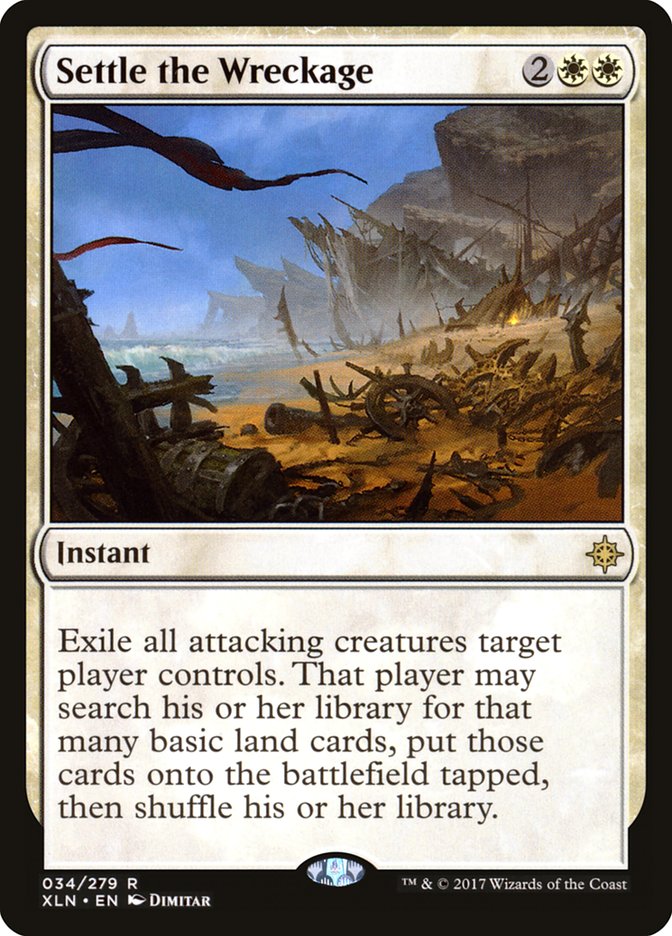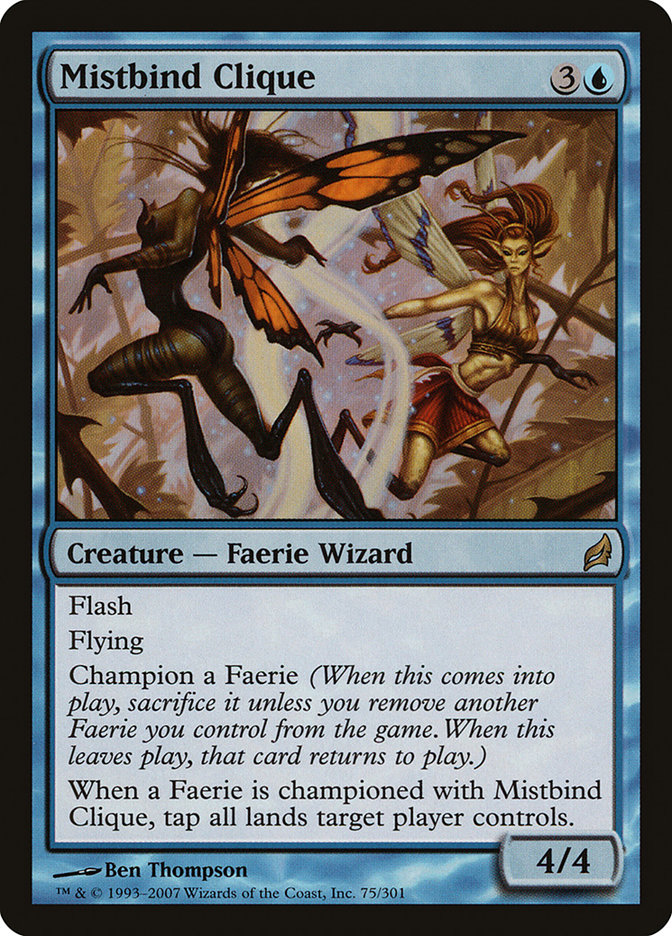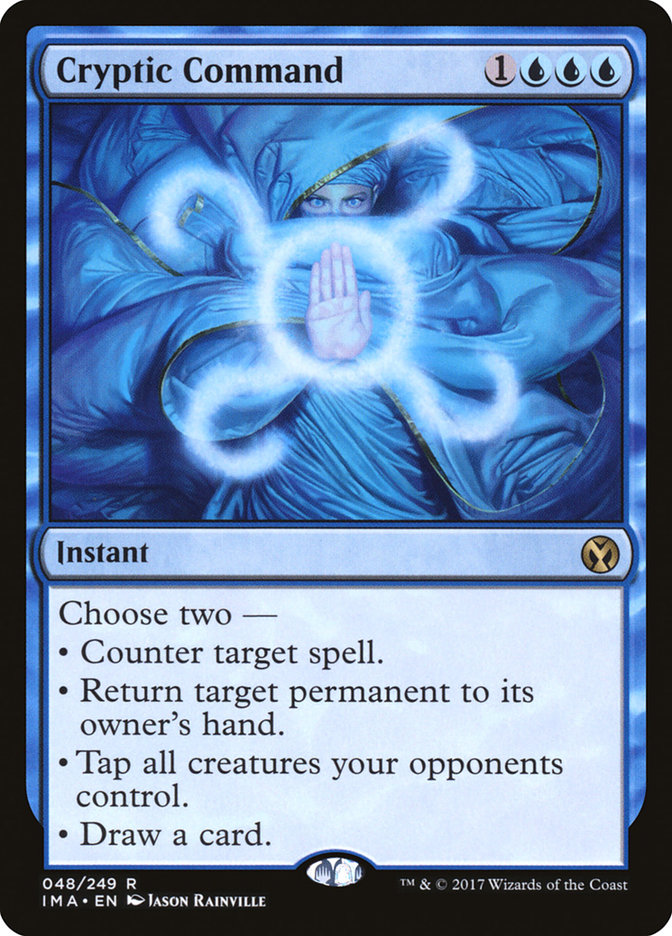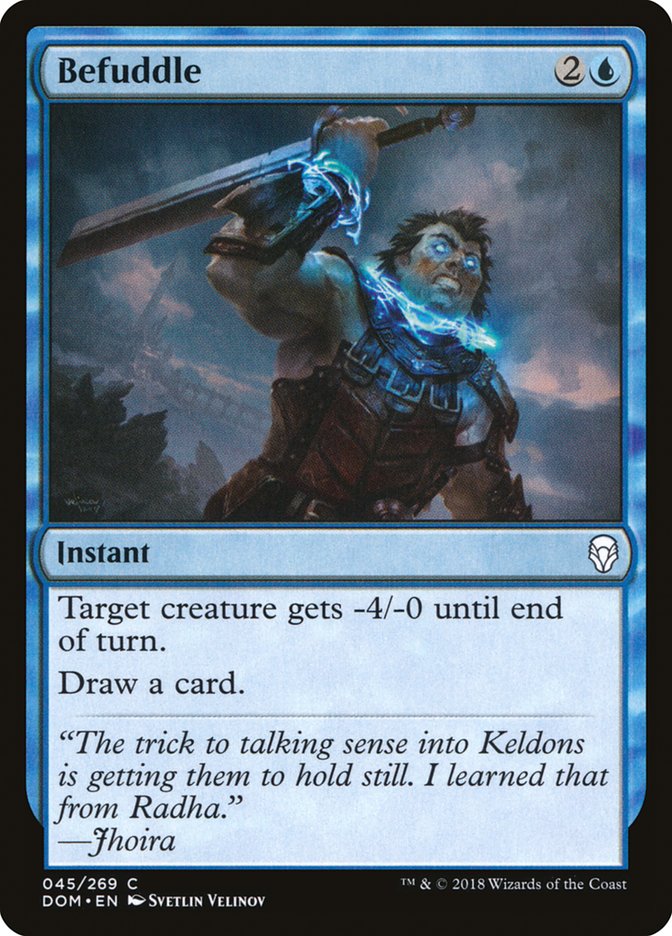There’s a popular Poker concept called fancy play syndrome that’s easy to
borrow to discuss a certain kind of mistake people make in Magic. At its
most extreme, a player will make a play because it’s clever or doesn’t come
up much and they’re glad that they found it. Even though it might not
actually be the best available play, often it just isn’t good at all. It’s
easy to understand why this is bad, but today, I’d like to consider a less
clear or extreme case.
A friend of mine asked about how to get to the point where you stop making
plays just because they generate value or seem good at the time, and
instead recognize when, for example, you can afford to let a two-for-one go
to hold a removal spell for a threat you actually can’t beat that might
come later. I thought this was a pretty interesting question.
Fundamentally, everyone learns to play Magic one move at a time. You’re
presented with a game you don’t have a deep understanding of, and you must
decide your first action. Over time, you learn to refine some of those
actions. During all this period, you’re improving your tactical play.
Learning to let a two-for-one go – you block a 2/2 with a 3/3, they use a
pump spell, and you let your 3/3 die because you can play another next turn
instead of using a removal spell to kill the 2/2 and save your 3/3 – this
is a simple example of learning to go beyond making a “good play” in the
moment.
Ultimately, the best way to learn how to evaluate when to make these plays
and when not to is to learn to think about the game strategically rather
than tactically. That is to say you need to come up with a plan about how
the rest of the game is going to go and an understanding of which cards
will matter, how you might lose, and what you can do to prevent that.
A common example in Dominaria Limited would be understanding that
the ground is going to get locked up and someone is going to win with a
bomb or a flier, so you shouldn’t use removal on ground creatures to save
life, push damage, or two-for-one a combat trick that is killing your
ground creature and/or saving theirs. That’s not to say that every game or
matchup will go this way or that this is what will always matter, but it’s
more common in Dominaria than most recent Limited formats (though
it’s very common in Sealed Deck in particular, anyway).
There’s a lot of overlap between tactical and strategic thinking, and both
will often lead to the same conclusion; after all, there’s really one best
play and both attempt to find it. Tactically, you shouldn’t use the removal
spell in the example above because it’s a more valuable card than the two
cards it would be trading with, so it would be a bad decision. At some
level that can be intuitive, but ultimately, strategic thinking is what
allows you to determine what it means for something to be more valuable and
how to assess which things have that value.
To take an example of this kind of overlap from Standard, if you’re playing
Mono-Green Aggro against U/W Control, each turn when your opponent has four
mana untapped you need to decide which creatures to attack with to play
around Settle the Wreckage; you’re generally trying to force your opponent
to cast it while committing/losing minimal resources and pressuring your
opponent enough that they can’t just ignore you while advancing their game
plan. Tactically, you’re deciding about which creatures play around Settle
best; strategically, you understand that your opponent has a finite number
of answers to your resolved creatures and you’re trying to run them out
while keeping enough creatures on the battlefield to finish them off. The
tactic that will allow you to accomplish that strategic goal is to force
your opponent to use their spell without committing too many resources.
I can’t really provide an example of times when tactical and strategically
correct decisions disagree, because again, both are working toward the same
end, so while the thinking is different, the conclusion is only different
when a mistake is made; the concern is just that one kind of thinking may
lead to making a mistake more often than the other.
I’ve discussed strategic thinking as being kind of on a higher order; it
informs tactical choices, but that doesn’t mean it’s better or more
advanced–it’s just a slightly different way of approaching a question.
People who play very strategic games – players who focus on their game plan
and possibly the way games generally play out may be more prone to
missing subtle unique spots in games where what’s happening deviates from
what usually happens – most often show when a player with inevitability
doesn’t start attacking when they should. They’ve been crafting a strategy
to stay alive, and so they don’t realize when they’ve reached a battlefield
that’s safe enough that they should start ending the game. Often, this
isn’t a big problem, since their deck is better in the late game and so far
ahead once they’ve turned the corner that they can give their opponent a
few extra draw steps without losing much equity, but this kind of mistake
can, for example, give a red deck a few extra draws to string together
enough burn to finish you off.
When this happens, tactical mistakes were made; there were turns where
making an attack was the tactically correct action, but what happened most
likely is that the tactical question was never really asked. The player was
so focused on the strategy of staying alive they didn’t consider a plan
that would advance what seemed like a different goal, in this case killing
the opponent.
So, understanding that the kinds of thinking are different and that each
are best suited to different goals, both are valuable and both may lead to
oversights, how do you learn how best to think about a game you’re actually
playing?
As I see it, your deck probably has a fundamental strategy. You should be
aware of that before the game begins, and on some level, it should inform
most of your decisions; however, the nature of Magic is that there’s more
hidden information early, and as the game progresses, more information is
revealed and you get a better sense of what the game will be about. What
this means is that on average, you should be playing a more tactical early
game and a more strategic late game – early on, your sequencing and card
use is going to just be jockeying for position and general advantages like
tempo and card advantage – whether you’re prioritizing tempo or card
advantage or whatever needs to be informed by your strategy, but in
general, early on if you’re offered a chance to make a play that gets you
ahead in some way, like a two-for-one, you should probably take it. Once
the game has taken shape you can start to form an end game strategy, and it
can be easier to figure out the most judicious use of your cards.
It’s becoming an old example at this point, so it’s probably before many
readers’ time, but it’s such an ideal example that I must go to it: When
playing Faeries in Standard a decade ago, on turn four you would often pass
with some combination of Mistbind Clique, Cryptic Command, Spellstutter
Sprite, and some kind of removal spell. You wouldn’t know exactly what you
were going to cast, you’d just react to whatever your opponent did with the
play that generated the most value for you. This would be a tactical
decision. After you got ahead early by making advantageous tactical
decisions, at some point you’d reach a turning point – the point where the
deck “turns the corner” – this is the point where you begin to deploy your
end game strategy; you’ve traded off enough resources to get the
game small enough that the amount of hidden information is manageable and
with the end in sight, your actions are now guided by a strategy about how
you can close out the game, instead of simply making the play that
generates the most nebulous value.
So we know how tactics and strategy are different, how they’re differently
suited to lead us to make different kinds of mistakes and find different
types of correct plays, and we know that, as a guideline, games move from
tactical to strategic (although it’s possible that the opening turns
specifically, before you really know what your opponent is doing, can best
be thought of as strategic–you’re just executing your strategy, and things
only really become tactical decisions once the game starts getting
interactive, but this early strategy I think is generally sufficiently
“auto-pilot” that it’s not terribly interesting or important to think of it
a strategic in nature). The next question is probably how to improve as a
player at thinking in ways you might not when you should.
Another quick example: A tactical player may be good at figuring what trick
their opponent is representing in combat and how likely they are to have
it. A strategic player will be able to figure out how much that trick
matters and whether it’s worth running into. Basically, I think a lot of
mid-level players – players who have gotten good enough to identify when
their opponent has something and narrow down what it could be – may be too
prone to “play around” the trick by not blocking a smaller creature with a
larger creature; a worse player might just block because they don’t
understand why their opponent would make such an attack that looks so good
for them on the surface, and a better player might also block
because, despite knowing that the opponent has a trick, they recognize that
the trick is a card that has value and they might be happy to trade their
creature for the trick now to make their opponent spend the mana and the
card and not have to worry about it for the rest of the game. Not blocking
just because you know they really have it is essentially fancy play
syndrome.
Incidentally, early in the game, I think blocking in that spot is almost
always right, because later the trick will threaten a more powerful
creature and early it’s more likely to take their entire turn to cast a
trick. Also later they can probably do it with mana they weren’t otherwise
using, and you also just don’t take damage that turn. The most common
exception is if you’ll be able to leave mana up after that turn for your
own counter trick that will generate a lot of value if your opponent tries
again the next turn and you might not otherwise find a great use for,
especially a card like Befuddle.
Next level reaction to that understanding: If your opponent took a hit and
then didn’t tap out, you should probably give them credit for something if
you respect them enough as a player to think they’re good enough that it’s
most likely that they took the previous hit for a reason like that, which,
if they didn’t block and now they’ve left a creature back to threaten to
block, is almost certainly what’s going on.
Anyway, back to the question at hand: How do you improve on this front?
Whenever you pick up a deck, make sure you know what its plan is. I may be
biased here. I have a strong aversion to midrange decks because they don’t
have a satisfactory answer to this question for me. Similarly, I like to
draft decks that have clear plans rather than just midrange collections of
good cards. My decks tend to be a bit more focused than average, and I’m
willing to get more extreme in my focus, using cards that are only good in
a strange niche strategy I’ve found. Either way, I’m pretty sure more
conventional decks can probably also be understood to have some strategy.
After that, just kind of let that percolate in the background while you
play your game, but try to come back to it when you reach a decision point.
This is another interesting topic. Every action in Magic is a decision, but
most of them don’t function as decision points because your action wasn’t a
question; you don’t have to figure out whether to play your land on the
first turn or not, so that’s not a decision point even if you did
technically make a decision. Decision points are when you must consider two
options. It’s great if you can set up an internal warning system that
notices when you’re making decisions so that you can double check them. The
harder the decision feels, the more you should be inclined to double check,
and that double check should ideally involve asking how this play will fit
into your larger plan.
The hardest mistakes to fix, as a bit of a tangent, are the ones that never
register as a decision, the kind of thing where when someone else asks why
you did or didn’t do something, the truth is simply that you never
considered the alternative. My best guess for fixing that is to look for
patterns in the kinds of things you overlook and try to build mental alarms
around them.
If you have issues with thinking too strategically, which would
best be identified because your mistakes come when you should be doing
something that is outside the typical goal of your deck, is really just to
try to slow down and take stock of your options.Try to pay careful
attention when something unusual has happened in a game or when you’re in a
spot you aren’t normally in.





